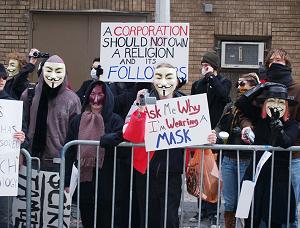Internet Karma, Hacktivism, and the New Paradigm
Dramatic prairie dogs, chocolate rain, lolcats, rickrolls, Obama girls, and Islamic rage boys… It’s a brave new world, indeed.
 | | Does the punishment fit the crime? |
For over a decade now, the world has seen the rise of a new and fickle form of cause and effect. This Internet karma is broad and powerful, and when it puts somebody in its sites, it is unrelenting. People like the “Star Wars Kid” (a teenager in Quebec whose enthusiastic lightsaber antics became an Internet phenomenon and lead to his being humiliated to an absurd degree, requiring psychiatric care and a major lawsuit that was settled out of court), the “Dog Poop Girl,” (a South Korean woman who was filmed, by camera phone, refusing to clean up the poop left behind by her dog on a subway; the video was posted on the Internet, along with the woman’s personal information, and she was subsequently harassed by millions and forced to leave her university under a cloud of shame), and the “Bus Uncle” (a Chinese man, again filmed by camera phone, who shouted at and insulted a younger man on a bus after the younger man calmly asked him to lower his voice; both men have dealt with excessive media attention and humiliation since) are prime examples.
There are also numerous verified incidents of people losing their jobs over e-mail exchanges, instant messages, web postings, and social networking information. It is even more difficult to find certain jobs—especially in the legal, governmental, educational, or political realm—if you have posted anything on the Internet. You don’t see many lawyers with MySpace pages who Twitter about their daily life.
Internet karma, though, doesn’t always damage lives. Occasionally, and with perfect randomness, it shines a light on an individual that propels him or her to instant stardom. Take people like Chris Crocker, for example. Crocker (an alias, I should point out) posted a video blog in which he ranted about the media’s treatment of Britney Spears, and though he did have to suffer through endless ridicule for it (not to mention the abhorrent treatment he received from Fox News), he toured the talk show circuit and is now going to star in his own television show.
 | | Chris Crocker: the most famous whining teenager of an age |
You don’t even have to have any verifiable talent to become such an Internet celebrity. The surreal Magibon, for instance, is a bonafide celebrity with media interviews and vocal work for the Japanese movie Blue Symphony under her belt following a series of videos she posted on YouTube. These videos, for the most part, entail her staring into the camera for several minutes, and that’s all.
A recent and fairly sedate example is the story of Monique White, a lonely mother whose children were spending Thanksgiving with their father. Not liking the prospect of a Thanksgiving dinner spent by herself and her partner, she posted a dinner invitation on Craigslist that landed her more than 30 guests. She happily cooked 9 turkeys and 4 hams, in addition to ludicrous amounts of stuffing and pie, and reportedly had the best Thanksgiving of her life. On the flip side, at a London Baba center, a girl's 16th birthday party was crashed by around 60 assholes who learned about the party on Facebook.
And this doesn’t even get into the realm of creative works, from the often amusing and always odd Internet cartoons (Joe Cartoon, Homestar Runner, Neurotically Yours, Salad Fingers, and Jib Jab, to name just a few) to the viral marketing of consumer products and big budget Hollywood movies. Then there’s the corporate concept “Web 2.0,” which has spawned a new form of advertising that may eventually become more pervasive than the advertising model of the last few decades. There’s also the political influence of the Internet, which is finally being realized by the likes of Ron Paul and president-elect Barack Obama.
 | | Viral marketing was amazingly successful for the Joker |
But there’s a disturbing side to all of this, even more disturbing than the handful of lives that have been ruined by the Internet’s fickle and hugely unbalanced vengeance. There is something called “hacktivism,” where a vox populi is used to spread political messages and sew dissention in the machine. This isn’t, by itself, a bad thing, but with the glorification of group think and the mass potential for illegal and violent action done in the name of any cause, hacktivism could be viewed as a primordial form of new-age terrorism.
You don’t even have to look too far to connect the dots. Al Qaeda, the most infamous world-wide terror organization in the modern world, uses the Internet to grand and horrible effect. Terrorists can and do use the Internet as a mouthpiece, influencing people in every corner of the globe. They can even post terrifying videos of beheadings and other acts. Palestinian suicide bombers, already glorified as heroes in their hometowns—replete with posters and trading cards—now regularly post their final messages on the Internet for the whole world to admire. While I am all for free speech and believe that more people react to these things with disgust than with admiration, this incitement to and glorification of violence is clearly not a good trend in society at large.
 | | Osama bin Laden, too, has embraced the information age |
And people use hacktivism for evils less obvious than pure terrorism. There is an underground movement called “Anonymous” that bands together people from the Internet in a sense that is very reminiscent of Ghost in the Shell. Anonymous is responsible for Project Chanology, a series of protests—both legal and not—designed to harass and expose the ridiculousness of Scientology. While I agree that Scientology is a dangerous and cultish absurdity, Project Chanology is anything but a solution to the problem. After all, religious types never respond to persecution with reasonable debate.
Then there’s the Electronic Disturbance Theater, an organization of hackers who clog servers, deface websites, spread left-wing propaganda, and have their own protests throughout the world. While cyberterrorism of this ilk doesn’t kill anyone, it is still a disruptive and unproductive influence.
Where we are is in the midst of a paradigm shift. It seems like we’ve come a long way in a short time, but the truth is, we still have a lot in front of us. Politicians and terrorists are only the latest groups to embrace the new paradigm and mould it to their will, but there are still plenty of people out there who haven’t yet connected.
We need to be prepared for what will happen when Internet karma starts happening on a larger scale, and it might already be underway. An argument can be made that president-elect Obama’s victory owes a lot to Internet celebrity. He might have won without it, but the possibility that he might not have should give you pause.
 | | Thanks to the Internet, you can now protest anonymously |
When lives can be destroyed by harmless arguments, dog poop, and pretending to play with a lightsaber, can countries be destroyed by similar means? In the last century, photographs printed in newspapers had strong international influence. In America alone, a photo of soldiers holding up the flag at Iwo Jima rallied the populace, while a photo of a soldier pointing a gun at the head of a Vietnamese man did the opposite. There have even been photos in this century that have had similar effect, like those taken at Abu Ghraib; note that those photos were disseminated by the Internet, not by newspapers.
Dire predictions aside, it still has the potential to be a weird circus in front of us. Imagine a future in which a diplomat gets in front of the U.N., accuses some nation of wrongdoing, and then starts a slide show of evidentiary satellite photos. Then, after a few blurry pictures go by, the U.N. is treated to Rick Astley’s video for “Never Gonna Give You Up.” Better yet, imagine a dictator informing the U.S. that “all your base are belong to us.”
The future will be far stranger than any of us imagined.
-e. magill, 12/01/2008
|
|